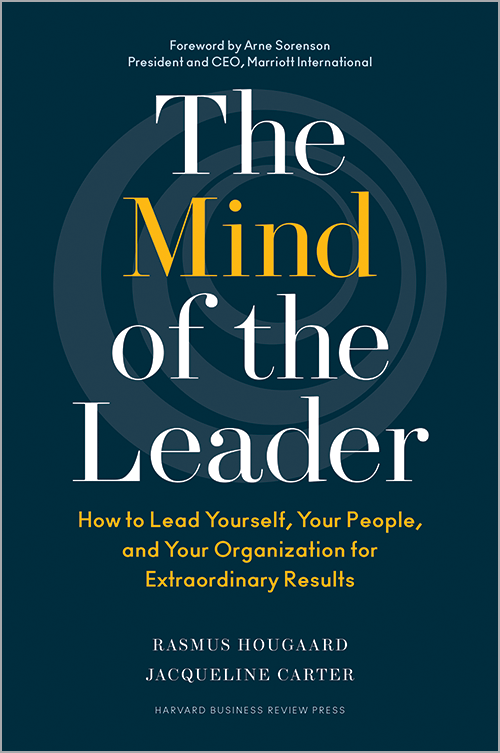The Mind of the Leader
How to Lead Yourself, Your People and Your Organization for Extraordinary Results


The authors are respectively founder and senior partner of consultancy business, Potential Project based in New York but with a global coverage. Rasmus Hougaard has been teaching mindfulness in organizations for over two decades. Previously he worked with Sony and as an OD researcher. Jacqueline Carter is an Organizational Behaviour Masters graduate and has been consulting in organizational effectiveness for over 20 years, previously with Deloitte. They co-authored On Second Ahead in 2016 with Gillian Coutts.
"How can we create more human leadership and people-centred cultures where employees and leaders are more fulfilled and more fully engaged?" is the question the authors set out to answer in this book. The solution, the authors claim, is to build organizations that draw on our common basic human needs for meaning, happiness, connectedness and a desire to contribute.
They and their research team surveyed and assessed over 30,000 leaders around the world, and conducted in-depth interviews with 100s of C-suite executives to build a framework they describe in the book. In essence it is encapsulated by one of their interviewees, the CEO of VW Audi in Spain saying: "Leadership today is about unlearning management and relearning being human".
Listen to our podcast with Jacqueline Carter here.
Taking the familiar three concentric circle model of leadership: self>team>organization as their foundation the authors offer a framework they call MSC Leadership, which pulls together what they identify from their research as the three critical mental qualities leaders need to master.
M is for Mindfulness. "When you learn to manage your attention, you learn to manage your thoughts…. you learn to be more present." Mindfulness they explain does not just calm us and heighten our creativity and improve the ethics of decision-making, but it also reduces our susceptibility to 'fight-or-flight' knee-jerk reactions and increases our emotional intelligence. Helping us to be more agile and effective.
S is for Selflessness. Organizations are, by definition, the sum of their people – otherwise they are not organizations. Understanding that you are only a cog in that machine should bring a sense of humility. The authors offer a 2×2 matrix for each of the MSC elements, here they grade confidence against selflessness. Those with least of both traits they term Narcissists. The confident and selfish are Egoists. The diffident and selfless are Pushovers – and the selfless but confident are Enablers. Interestingly they note confidence is a required trait for success, but adding selflessness also brings sustainablility.
C is for Compassion. Compassion they say is hard not soft. It is being honest about things. It means leads to different ways of doing things, but still doing them. "Compassion allows us to be rational and see the bigger picture and make better decisions for other people" and is different from empathy which is too individually specific. Critically, compassion fosters trust, that key to leadership.
The authors synthesize a huge amount of data and research – and no doubt their own field experience too in bringing their MSC model together. They recognize that the leaders' role is to enable high performance, and that performance today comes from happy, motivated, balanced employees – so leaders need to ensure those adjectives describe their people. As with all these theories – and leadership in general – it is simple in theory, the hard task in implementing it. That is what the bulk of this book explains.
Title: The Mind of the Leader: How to Lead Yourself, Your People and Your Organization for Extraordinary Results
Author/s Name/s: Rasmus Hougaard; Jacqueline Carter
Publisher: Harvard Business Review Press
ISBN: 978-1633-69-34-25
Number of Pages: 256
Author Knowledge Rating: 1-5 (based on their years of experience, academic expertise in subject areas, and exposure to cross-functional thinking in the area)













































Readability: 1-5 score(1=dense and v academic; 5=frantic; page turner)



































































Appropriate Length: (1=could have been written in 25% of the length;5=could have been longer)



























































Core Idea Value: (1=nonsense (or entirely esoteric); 5=game-changer)


































































